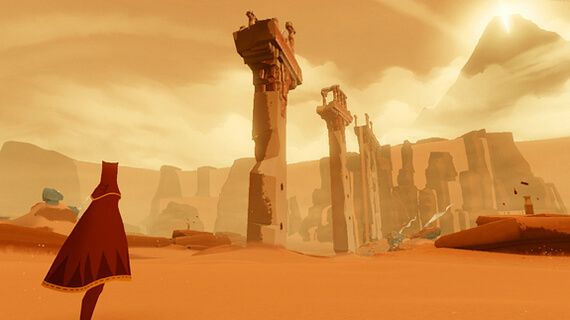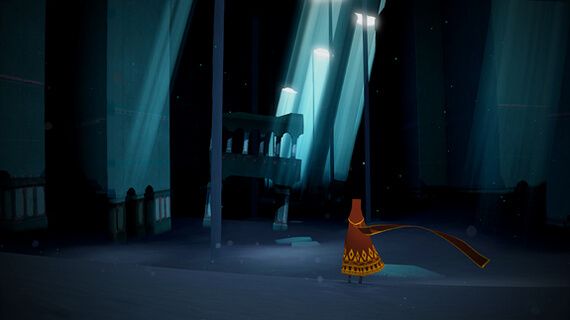Game Rant's Jeff Schille reviews Journey
Journey is a confounding game to review. That is largely by design, and one could say the same about thatgamecompany's previous efforts, flOw and Flower. Although it is possessed of mechanics that evolve over the course of the experience, Journey isn't about its mechanics in the way that, say, Modern Warfare 3 is about shooting things.
Indeed, discovery defines the experience of playing Journey as much as anything can be said to. Discovery of the game's simple, minimalist mechanics, discovery of the hidden features and meanings of the game's world, and best of all, the discovery of other travellers on the same journey.
Truthfully, the less players know about Journey at the outset, the better. As such, this review will endeavor to be as spoiler-free as possible (although players determined to go in with a little extra knowledge may want to check out this list of Journey's trophies). For readers who simply want to know whether or not the game earns a recommendation from this reviewer, it does. Frankly, I'd like everyone to play Journey. I am not, however, sure that everyone will appreciate it equally.
Journey opens on a hill in the desert, with a volcano-like peak visible in the distance that is the player's destination. Covering the distance between those two points makes up the entirety of the experience. In that sense, Journey can accurately be described as a game about traversal, though to do so would be reductive (for more details, check out Game Rant's E3 2011 Journey preview).
Though it is not demanding mechanically --in fact, completing the short game is a cinch -- Journey is demanding of players' attention. Everything that happens in Journey happens in the game world and to the character -- there is no in-game map, no status bar, no arrow to point the way forward. Save for a few brief control prompts early on, there is no onscreen UI at all -- nothing to get in the way of Journey's gorgeous, singular visual presentation.
Though the game's landscapes are stylized and occasionally abstract (and sometimes resemble the legendary album covers drawn by Roger Dean), thatgamecompany did not use Journey's visual design as an excuse to present a flat, featureless world. Journey's often expansive environments shimmer and glitter in the heat of the sun, while sand is blown all around and reacts as players move through it (see for yourself in this Journey beta footage), though desert is not the only terrain waiting to be crossed.
Journey is not merely pretty, it is often breathtakingly beautiful -- almost hypnotically so. Everything moves as if under water, slowly and with flowing grace. Journey's orchestral score, alternately somber and soaring, matches the game's measured pace.
At its best, the game envelops players with remarkable beauty and the wonder of discovery, creating a calm reverie that is wholly unique. That said, much rests on players giving themselves to that reverie. Players who, for whatever reason, are unmoved by Journey's visual splendor will likely be left wondering what all the fuss is about. There is little in Journey, mechanically, to compensate, and the game's intentionally obscure storytelling all but ensures that the short attention span crowd need not apply.
Still, Journey is wondrous. It is a game with a point of view. There is a pervading sense that the designers at thatgamecompany strove to deliver a very personal, very specific message to players through the game. Though opinion will likely vary on exactly what that message is, the presence of an authorial perspective palpably enriches the experience at hand.
Take, for instance, Journey's online multiplayer. Players who opt in will, sooner or later, encounter other travellers. There is absolutely no verbal or written communication between characters, no requirement that players collaborate, and no penalty for simply going ahead alone. Nonetheless, it is quietly fascinating to watch another random player working through the game, and it is telling that there are opportunities for players to behave benevolently. Despite the anonymity of the experience, travelling with a companion manages to make Journey's rewards that much richer.
There is a temptation to look at the whole of Journey as a rebuke to the violence and viscera-obsessed titles that regularly dominate sales charts (it's true that if there is a polar opposite to those games, Journey is it). As such, players who love nothing more than curb stomping a Locust head in Gears of War might not be expected to embrace Journey -- and that would be their loss.
However, there is a downcast, exclusionary cynicism in that evaluation that Journey simply does not abide -- cynicism is not a part of the game's worldview. Rather, Journey is an uplifting, ultimately joyous exploration of what games can accomplish and convey. It is a celebration of the medium and its myriad possibilities, and a gift of great and singular beauty to players -- all players. This Journey truly is its own reward, and comes highly recommended.
Journey is available now, exclusively for PlayStation 3.
-
Follow me on Twitter @HakenGaken




